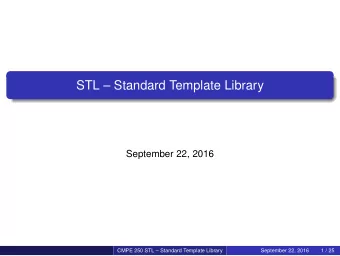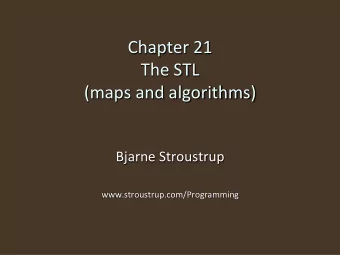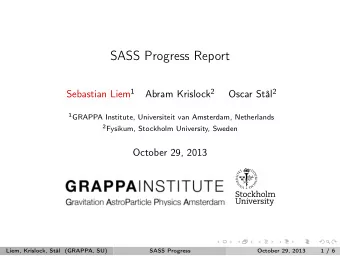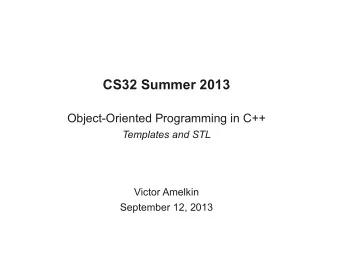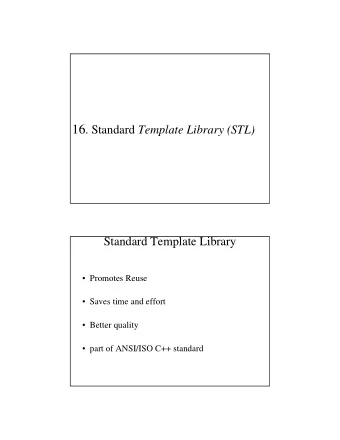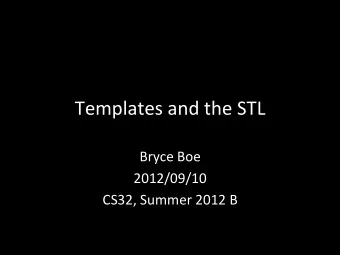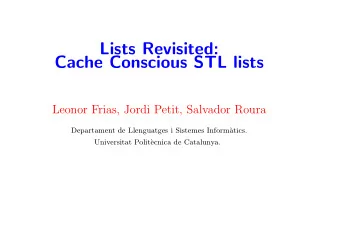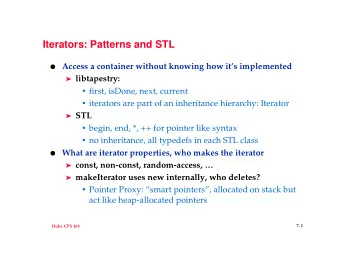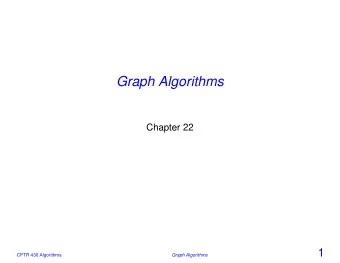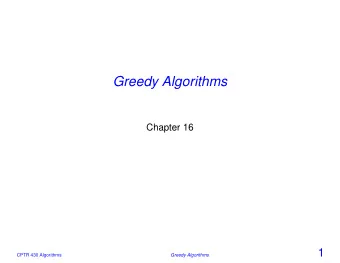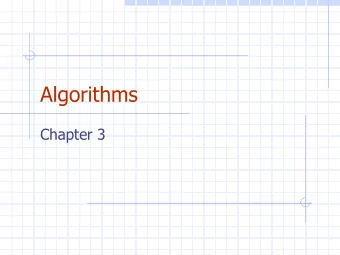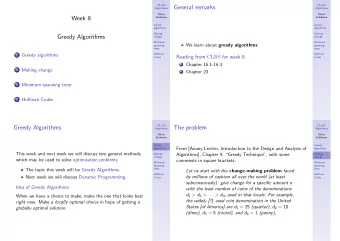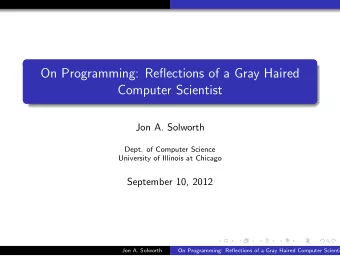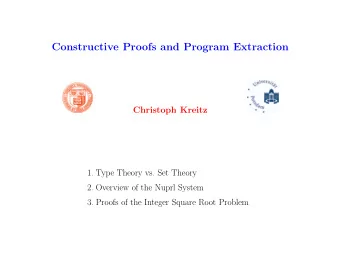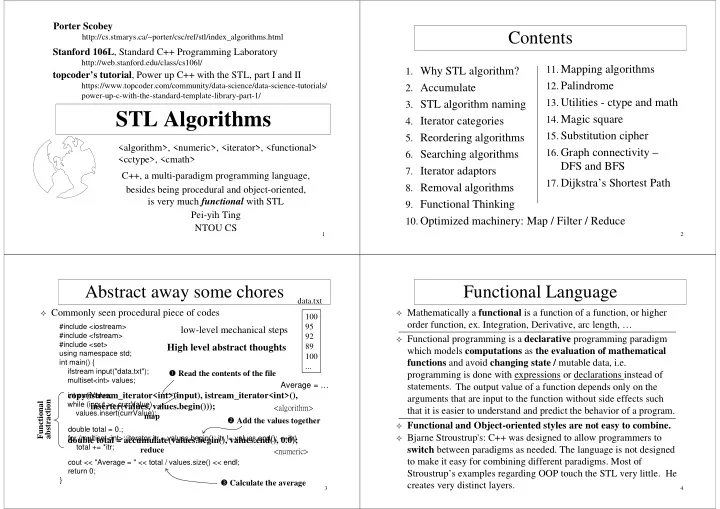
STL Algorithms 14. Magic square 4. Iterator categories 15. - PowerPoint PPT Presentation
Porter Scobey Contents http://cs.stmarys.ca/~porter/csc/ref/stl/index_algorithms.html Stanford 106L , Standard C++ Programming Laboratory http://web.stanford.edu/class/cs106l/ 11. Mapping algorithms 1. Why STL algorithm? topcoders tutorial ,
Porter Scobey Contents http://cs.stmarys.ca/~porter/csc/ref/stl/index_algorithms.html Stanford 106L , Standard C++ Programming Laboratory http://web.stanford.edu/class/cs106l/ 11. Mapping algorithms 1. Why STL algorithm? topcoder’s tutorial , Power up C++ with the STL, part I and II 12. Palindrome https://www.topcoder.com/community/data-science/data-science-tutorials/ 2. Accumulate power-up-c-with-the-standard-template-library-part-1/ 13. Utilities - ctype and math 3. STL algorithm naming STL Algorithms 14. Magic square 4. Iterator categories 15. Substitution cipher 5. Reordering algorithms <algorithm>, <numeric>, <iterator>, <functional> 16. Graph connectivity – 6. Searching algorithms <cctype>, <cmath> DFS and BFS 7. Iterator adaptors C++, a multi-paradigm programming language, 17. Dijkstra’s Shortest Path 8. Removal algorithms besides being procedural and object-oriented, is very much functional with STL 9. Functional Thinking Pei-yih Ting 10. Optimized machinery: Map / Filter / Reduce NTOU CS 1 2 Abstract away some chores Functional Language data.txt Commonly seen procedural piece of codes Mathematically a functional is a function of a function, or higher 100 order function, ex. Integration, Derivative, arc length, … 95 #include <iostream> low-level mechanical steps #include <fstream> 92 Functional programming is a declarative programming paradigm #include <set> 89 High level abstract thoughts which models computations as the evaluation of mathematical using namespace std; 100 functions and avoid changing state / mutable data, i.e. int main() { ... ifstream input("data.txt"); Read the contents of the file programming is done with expressions or declarations instead of multiset<int> values; Average = … statements. The output value of a function depends only on the copy(istream_iterator<int>(input), istream_iterator<int>(), int currValue; arguments that are input to the function without side effects such abstraction Functional while (input >> currValue) inserter(values, values.begin())); <algorithm> that it is easier to understand and predict the behavior of a program. values.insert(currValue); map Add the values together Functional and Object-oriented styles are not easy to combine. double total = 0.; Bjarne Stroustrup's: C++ was designed to allow programmers to for (multiset<int>::iterator itr = values.begin(); itr != values.end(); ++itr) double total = accumulate(values.begin(), values.end(), 0.0); total += *itr; switch between paradigms as needed. The language is not designed reduce <numeric> to make it easy for combining different paradigms. Most of cout << "Average = " << total / values.size() << endl; return 0; Stroustrup’s examples regarding OOP touch the STL very little. He } Calculate the average creates very distinct layers. 3 4
Tools for Functional Abstraction accumulate() Your first high-level machinery Algorithms: optimized machinery #include <numeric> accumulate sums up the elements in a range and returns the result Map: initial value [ begin(), end() ) transform / copy / for_each / replace / sort / partition multiset<int> values; … Filter: double total = accumulate(values.begin(), values.end(), 0.0); removal (find and erase) accumulate(values.lower_bound(42), values.upperbound(99), 0.0); Reduce: accumulate / min_element / count / equal / search / selection Your first higher order function (user customized) accumulate is a general-purpose function for transforming a customized with callable objects collection of elements into a single value (in functional language (functions and functors) terms: reduce / collect / convert / join / fold) int findLess(int smallestSoFar, int current) { Core data structure: container return current < smallestSoFar ? current : smallestSoFar; } int smallest = accumulate(values.begin(), values.end(), numeric_limits<int>::max(), findLess); <limits> 5 6 Advantages Algorithm Naming Conventions More than 50 STL algorithms (<algorithm> and <numeric>) Simplicity : xxx_if (replace_if, count_if, …): means the algorithm will perform a task on elements only if they meet a certain criterion Leverage off of code that is already written for you rather than require a predicate function: accepts an element and returns a bool reinventing the code from scratch; don’t duplicate code e.g. bool isEven (int value) { return value %2 == 0; } Correctness : cout << count_if (myVec.begin(), myVec.end(), isEven ); already tested without manual mistakes xxx_copy (remove_copy, partial_sort_copy, …): performs some task Speed : on a range of data and store the result in another location (immutable) STL algorithms are optimized such that they are faster than most e.g. int iarray[] = {0, 1, 2, 3, 3, 4, 3}; vector<int> myV(7); code you could write by hand reverse_copy (iarray, iarray+7, myV.begin()); Clarity : xxx_n (generate_n, search_n, …): performs a certain operation n times (on n elements in the container) With a customized for loop, you would have to read each line in the Two consecutive 3 e.g. fill_n (myDeque.begin(), 10, 0); loop before you understood what the code did. vector<int>::iterator it= search_n (myV.begin(), myV.end(), 2, 3); 8 7
Iterator Categories Iterator Categories (cont’d) STL iterators are categorized based on their relative power Functionalities: minimal (I/O) => maximal (Random-Access) Random-Access Iterators For example, iterators for vector/deque support container.begin() +n , while itr + distance; iterators for set/map only support ++ (efficiency reasons) itr += distance; std::advance(itr, distance); itr1 < itr2; std::distance(itr1, itr2); itr2 - itr1; Categories: itr[myIndex]; *(itr + myIndex); Output Iterators: *itr = value, referred object is write-only, ++, no --, +=, - Bidirectional Iterators Input Iterators: value = *itr, referred object is read-only, ++, no --, +=, - --itr; Forward Iterators: both *itr = value and value = *itr, ++ is OK but not -- Forward Iterators Bidirectional Iterators: iterators of map/set/list , ++, -- are OK but not +=, - Random-Access Iterators: iterators of vector/deque , ++, --, +=, -, <, >, +, [] Input Iterators Output Iterators val = *itr; *itr = val; If an algorithm requires a Forward Iterator, you can provided it with ++itr; ++itr; a Forward/Bidirectional/Random-Access iterator. If an algorithm demands an Input iterator, it guarantees that the container pointed by the Input iterator is read-only by this algorithm. 9 10 Reordering Algorithms Reordering Algorithms (cont’d) sort // random-access iterators reverse // bidirectional iterators sort(myVector.begin(), myVector.end()); reverse(myVector.begin(), myVector.end()); // i.e. vector or deque only, cannot sort list, set or map // each element must provide operator< or comparison function random_shuffle // random-access iterators ex.bool compStrLen(const string &one, const string &two) { // or pass by value random_shuffle(myVector.begin(), myVector.end()); return one.length() < two.length(); shuffle (C++11) // random-access iterators } use pair to do multifield comparison unsigned seed = std::chrono::system_clock::now().time_since_epoch().count(); sort(myVector.begin(), myVector.end(), compStrLen); shuffle(myVec.begin(), myVec.end(), std::default_random_engine(seed)); stable_sort, partial_sort, partial_sort_copy, is_sorted, nth_element rotate // forward iterators partition // bidirectional iterators rotate(v.begin(), v.begin()+2, v.end()); // begin, middle, end bool isOdd(int i) { return (i%2)==1; } // (0, 1, 2 , 3, 4, 5) => (2, 3, 4, 5, 0, 1) vector<int> myvector; for (int i=1; i<10; ++i) myvector.push_back(i); // 1 2 3 4 5 6 7 8 9 next_permutation // bidirectional iterators, operator< vector<int>::iterator bound = int v[] = {1, 4, 2}; std::partition(myvector.begin(), myvector.end(), isOdd); next_permutation(v, v+3); // (1, 4, 2) => (2, 1, 4) // possible result: 1 9 3 7 5 6 4 8 2 stable_partition, is_partitioned find next with carry prev_permutation bound 12 11
Recommend
More recommend
Explore More Topics
Stay informed with curated content and fresh updates.
